Related Research Articles
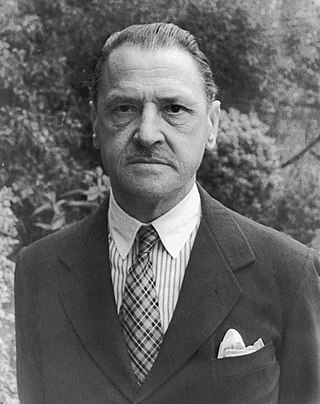
William Somerset Maugham was an English writer, known for his plays, novels and short stories. Born in Paris, where he spent his first ten years, Maugham was schooled in England and went to a German university. He became a medical student in London and qualified as a physician in 1897. He never practised medicine, and became a full-time writer. His first novel, Liza of Lambeth (1897), a study of life in the slums, attracted attention, but it was as a playwright that he first achieved national celebrity. By 1908 he had four plays running at once in the West End of London. He wrote his 32nd and last play in 1933, after which he abandoned the theatre and concentrated on novels and short stories.
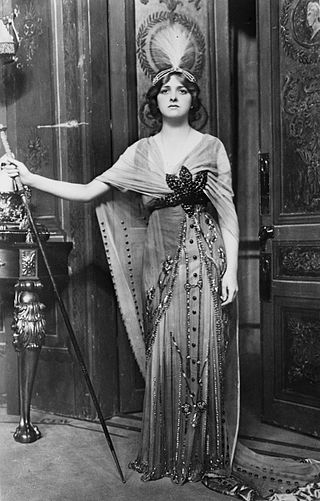
Dame Gladys Constance Cooper, was an English actress, theatrical manager and producer, whose career spanned seven decades on stage, in films and on television.

Sir Charles Henry Hawtrey was an English actor, director, producer and manager. He pursued a successful career as an actor-manager, specialising in debonair, often disreputable, parts in popular comedies. He occasionally played in Sheridan and other classics, but was generally associated with new works by writers including Oscar Wilde and Somerset Maugham.

Frederic Herbert Maugham, 1st Viscount Maugham, was a British barrister and judge who was Lord Chancellor from March 1938 until September 1939.

Robert Cecil Romer Maugham, 2nd Viscount Maugham, known as Robin Maugham, was a British author.

The Constant Wife, a play written in 1926 by W. Somerset Maugham, is a comedy whose modern and amusing take on marriage and infidelity gives a quick-witted, alternative view on how to deal with an extramarital affair.
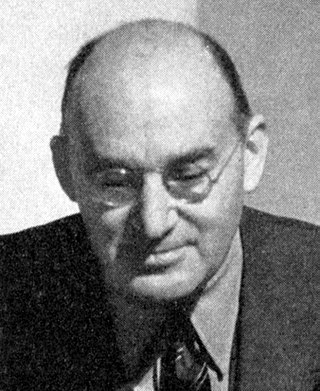
Samuel Nathaniel Behrman was an American playwright, screenwriter, biographer, and longtime writer for The New Yorker. His son is the composer David Behrman.

In Christianity, feeding the multitude comprises two separate miracles of Jesus, reported in the Gospels, in which Jesus used modest resources to feed thousands of followers who had gathered to see him heal the sick.
Francis Martin Sewell Stokes was an English novelist, biographer, playwright, screenwriter, broadcaster and prison visitor. He collaborated on a number of occasions with his brother, Leslie Stokes, an actor and later in life a BBC radio producer, with whom he shared a flat for many years overlooking the British Museum. It was here that Sewell Stokes did much of his writing in the Reading Room, used by so many distinguished writers over the years.

The Letter is a 1927 play by W. Somerset Maugham, dramatised from a short story that first appeared in his 1926 collection The Casuarina Tree. The story was inspired by the real-life Ethel Proudlock case which involved the wife of the headmaster of Victoria Institution in Kuala Lumpur who was convicted in a murder trial after shooting dead a male friend in April 1911. She was eventually pardoned.
Major Sir John Arnold Wallinger was a British Indian intelligence officer who led the Indian Political Intelligence Office from 1909 to 1916. As a colonial policeman and counter-intelligence officer he became a specialist in countering those opposed to British rule in India, operating both in India and in England.
Charles Vernon France was a British actor, usually credited as C. V. France.

"Rain" is a short story by the British writer W. Somerset Maugham. It was originally published as "Miss Thompson" in the April 1921 issue of the American literary magazine The Smart Set, and was included in the collection of stories by Maugham The Trembling of a Leaf.
Robert Lorin Calder, a Canadian writer and professor, won the Governor General's Award for English-language non-fiction in 1989 for his Willie: The Life of W. Somerset Maugham, a biography based on extensive archival work and interviews with surviving associates of Maugham, in particular Alan Searle. Unlike Ted Morgan, who had obtained permission from Maugham's executors to publish from Maugham's letters in his biography (1980), Calder was refused permission to do so by the Royal Literary Fund and had to rely on paraphrase in referencing Maugham's unpublished correspondence.

Lady Frederick is a comedy by the British writer W. Somerset Maugham, written early in his career. The play was first seen in London in 1907, and was very successful, running for 422 performances. The title role was played by Ethel Irving. In New York it was first performed in 1908, with Lady Frederick played by Ethel Barrymore, who reprised her role in the play's film adaptation, The Divorcee.

Penelope is a 1909 play by W. Somerset Maugham. The play ran for 246 performances.
John Ellingham Brooks was an English classical scholar. He was an associate and lover of Somerset Maugham, whom he met when they were both studying in Heidelberg in 1890. In later life, he was part of the circle of expatriates based on the Italian island of Capri, where he shared a villa with the novelist Edward Frederic Benson.
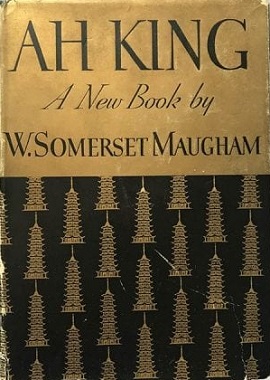
Ah King is a collection of short stories set in the Federated Malay States and elsewhere in Southeast Asia during the 1920s by W. Somerset Maugham. It was first published by the UK publishing house, Heinemann, in September 1933; the first American edition was published on November 8 of the same year by Doubleday Doran, New York. The book was published in French translation as La Femme dans la Jungle (1935) and in Spanish as Ah King, mi criado china (1946).
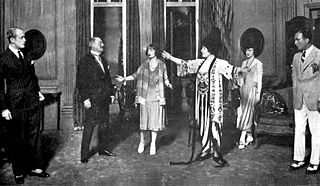
The Circle: a Comedy in Three Acts is a play by W. Somerset Maugham. It was first produced at the Haymarket Theatre, London on 3 March 1921, and has been revived several times in the West End and on Broadway.
References
- ↑ Loaves and Fishes (1924) by W. Somerset Maugham. A Comedy in Four Acts. Mymaughamcollection.com. Published March 12, 2014.